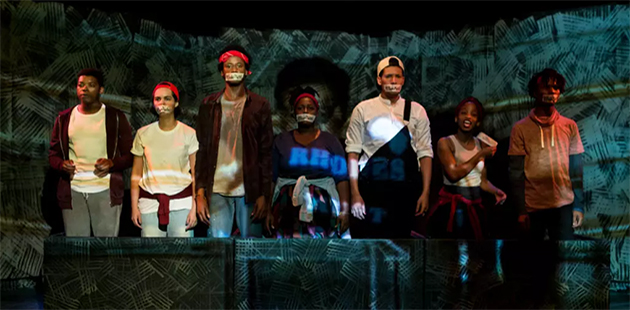 The Fall, an account of a student uprising at the University of Capetown (UCT) in 2015, was written and performed by seven students who were involved. I had the feeling that there might be more to this tale than the work’s 80 minutes allowed.
The Fall, an account of a student uprising at the University of Capetown (UCT) in 2015, was written and performed by seven students who were involved. I had the feeling that there might be more to this tale than the work’s 80 minutes allowed.
The student movement at UCT coalesced around the desire to remove a statue of the colonial figure Cecil Rhodes. The statue recognised Rhodes’ “donation” of land to found the original UCT campus. Through the voices of non-white South African students, we were (lightly) informed of Rhodes’ colonial exploits, how he symbolised their white oppressors, and how in the interests of “de-colonisation” the statue had to go.
As an outsider, the fixation on Rhodes’ statue was interesting for various reasons. Stephen Fry suggested that the rush of citizen commentators to damn people showed how many had lost the capacity to appreciate complexity. Is it now impossible to acknowledge any virtues of flawed historical figures, whether it be the amoral artistic genius Henri de Toulouse-Lautrec, or the slave-owner then abolitionist Thomas Jefferson?
If sympathy for a dead rich white man seems provocative, it was caused by the characters in The Fall. I suspect Rhodes would have been brought up to believe in the appropriateness of the British colonial way, with white supremacy reinforced by education. I wonder who amongst the “woke” of recent times will not feel the moral judgement of future generations, as Germaine Greer might report.
Despite their hostility towards Rhodes, the characters in The Fall held their own indoctrinated, barely-examined biases. These were shown in the rapid-fire exchanges at the sporadic gatherings of the student leaders. Individual students would show their inability to use language that was inclusive of transgender identifying peers.
Male students would justify their prominence on the tv coverage of protests by saying of their society that “Men were the head, and women were the neck”. From the vigour of the clashes and inability to recognise their own ingrained prejudices (any more than Rhodes could have?), in terms of tone, The Fall slid into almost-comedic moments that felt unintended.
Yet, when there were deliberate attempts to use humour, such as having a student from a wealthy family seek to clarify what “decolonialism” was, the jokey manner of asking and responding, rather than a discussion, robbed the student (and consequently us) from gaining an understanding of what this means in the South African context.
I also found the arguments of the play somewhat undiscriminating and unsatisfying. Symbols of the past are one thing, but what of the current leadership and their culpability in the issues facing UCT?
President Jacob Zuma (of Nelson Mandela’s African National Congress) finally resigned in 2018 after a time of looting South Africa’s coffers for his own ends. While the rich white men honoured on university campuses are long dead, it seems that certain rich black men in South Africa are doing just fine, even if the poor black students at UCT are living on two-minute noodles.
The Fall certainly had entertaining moments. The work gave a sense of South African culture and spirit, such as through the combination of singing and dancing with accounts of the action as the protesters stormed the UCT administration building. In this story of taking down a statue, the cast have made a monument to how change can be affected by youthful zeal and idealism.
The Fall
Fairfax Studio – Arts Centre Melbourne, 100 St Kilda Road, Melbourne
Performance: Tuesday 28 August 2018 – 7.30pm
Season continues to 2 September 2018
Information and Bookings: www.artscentremelbourne.com.au
Image: The Cast of The Fall (supplied)
Review: Jason Whyte
